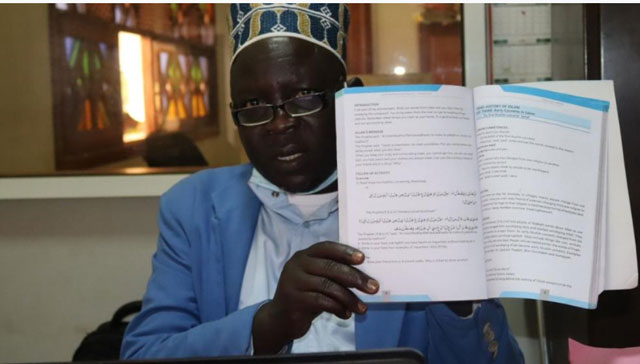
Kampala, Uganda | THE INDEPENDENT | The Uganda Muslim Supreme Council (UMSC) has asked the Ministry of Education and Sports to recall self-study materials over errors made in the Islamic Religious Education (IRE) and Arabic Content content.
Sheikh Juma Bakhit Cucu, the Secretary for Education at UMSC says that the council has been reviewing materials recently produced by the National Curriculum Development Centre-NCDC in the two learning areas, and found that it was full of errors that might mislead learners.
The said self-study materials were developed to supplement home studying at the time when children were grounded in homes as part of the COVID-19 lockdown that lasted close to two years. Given the fact that they were covering the entire syllabi of each class, they are core reference books even at the time when learners are back at school.
But Sheikh Cucu pointed out that much of the Arabic in the Primary Four self-study booklet, written as quoting from Hadith (teachings of prophet Muhammad) and The Holy Quran, bears no meaning and cannot be understood. The Muslim educationist adds that in some cases Arabic text in the booklet was written left to right yet in Arabic words are written running from right to left.
Cucu notes that prior to the production of these books, the Uganda Muslim Supreme Council-UMSC had discussions with the National Curriculum Development Centre requesting them to involve their education department in developing and approving IRE and Arabic language curriculum and reading materials. However, he adds, their appeal was ignored.
He also questioned the integrity of the experts hired by the National Curriculum Development Centre claiming that the Uganda Muslim Supreme Council has learnt that a Reverend Father and another Christian member are the only specialists of religious education. He questions whether the two experts from different religious denominations are grounded in Arabic and the Holy Quran.
Although Grace Baguma, the Executive Director of the National Curriculum Development Centre acknowledges that there are errors that were made in the IRE section of the study materials in the primary section but says that these might have come up during the printing phase.
The materials were prepared by the National Curriculum Development Centre and the printing was carried out by the Ministry of Education and Sports which contracted three publishers; Baroque Publishers, MK Publishers, and Fountain Publishers to take on the duty. Available information indicates that the actual printing was mainly conducted in the United Arab Emirates.
Meanwhile, Baguma also refutes claims that the materials were developed by non-Muslims who are not grounded in the Arabic language and matters of the Islamic faith. She notes that before preparing any material the National Curriculum Development Centre invites a panel of experts which include teachers, tutors, university lecturers, and religious (in case of RE and Arabic language), who verify the information before it is printed.
“It’s true that previously the head of religious education was a non-Muslim. But, that doesn’t discredit their ability in the subject matter? NCDC, just like any other government entity, employs people based on their qualification and area of expertise, not religion. That aside, the current head of that section is a Muslim in the name of Abdul-Aziz Kakooza. He is in charge of Religious Education (IRE and CRE) and Arabic language,” she adds.
Kakooza, an RE and Arabic Language curriculum expert also explains that the error in translations that are cited by the council could have been made during the transfer of content from the National Curriculum Development Centre to those who produced the final product. He adds that computers that are not configured to read the Arabic language can distort the text leading to errors.
Another source at the National Curriculum Development Centre who preferred anonymity to freely comment on the matter noted that the content that created a situation between Uganda Muslim Supreme Council and the National Curriculum Development Centre was also useless in the material.
“Adding the Arabic language in Islamic Religious Education at that level was not necessary. The content was hyper pitched. This was done at the request of Muslim religious experts. Normally, when Arabic is going to be included; the National Curriculum Development Centre prefers handwriting which is then scanned and put in the books as an image,” says the source.
The source further adds that although the error is regrettable, the conversation is turning away from the mistake into politics since it’s now used to push a different narrative of marginalizing Muslims.
But, Sheikh Cucu dismisses the politics and said that all they want is to ensure that learners are not fed on the wrong information. He adds that they have already petitioned the Ministry to recall the books in question from schools and rectify the identified errors.
Baguma notes that NCDC is going to ensure that the online version of the material in question is corrected in the shortest time possible. However, she has not yet committed herself to the possibility of recalling hard copies from schools.
Printing and distribution of the materials was funded using a special grant obtained from the Global Partnership for Education. Although the ministry has been cagey on the actual amount of money spent, the grant had set aside sh20.8 billion to print and distribute self-study materials.
****
URN
 The Independent Uganda: You get the Truth we Pay the Price
The Independent Uganda: You get the Truth we Pay the Price



